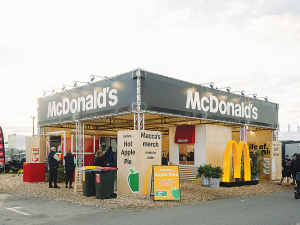Subsidies keeping wind, solar generation viable
OPINION: I recently wrote an open letter to the Prime Minister because at a recent Federated Farmers meeting, Chris Luxon told me wind and solar generation is not subsidised.
 Aside from serving free soft serves and apple pies, McDonald’s hosted a panel at the Fieldays to discuss the future productivity, profitability and resiliency of the beef sector.
Aside from serving free soft serves and apple pies, McDonald’s hosted a panel at the Fieldays to discuss the future productivity, profitability and resiliency of the beef sector.
OPINION: Recently I spent a couple of days on the Macca's site at Fieldays.
A few years ago, our first appearance at the southern hemisphere's biggest agri-business event was novel, and a bit misunderstood. Was Macca's there to sell some burgers? Why would one of the world's biggest food services companies want a site alongside a stock gate seller, and just down the road from the possum trap stand?
Aside from the free soft serve and apple pies, this year we hosted the New Zealand Roundtable for Sustainable Beef (NZRSB) at the Fieldays Pavilion, with a group representing the full value chain of the beef sector. We're a founding member, and our job is to provide insight into the consumer end of that value chain. With global brands like McDonald's making commitments around climate change, we're wanting the beef sector to accelerate its positive change, So, on a panel of subject matter experts, I was there to provide a mix of Macca’s global perspective, and what our local customers are telling us.
When you’ve got a target to be able to get a drive-thru customer from the point of order through to collecting their order in a matter of minutes, it can be hard to get them to think about where the ingredients that went into their food came from. Generally, they care more about the price, quality, convenience, and experience. That’s a key part of the success of the McDonald’s business model.
The good news for us is that around 90% of the produce we use across our menu is sourced in New Zealand. Aotearoa is a great producer of quality produce. In fact, we’re so good that the McDonald’s world wants our produce. Last year 37,000 tonnes of beef was exported to other McDonald’s markets. That’s around 10% of New Zealand’s total beef exports.
So, while we’re a minnow in the McDonald’s world in terms of restaurants, we’re a strategically important country in a supply chain that feeds around 70 million people around the world each day.
With that strategic importance comes responsibility. 99% of McDonald’s global emissions come from scope 3 sources. Beef farming is the single biggest contributor to McDonald’s greenhouse gas emissions. As a top 10 beef export market to McDonald’s, that explains why we’ve been working with the beef sector for over a decade to look at ways to further reduce methane emissions.
Another part of my day job is meeting with people across our supply chain. Recently I’ve attended the Zanda McDonald Summit and the NZRSB conference. As much as we talk about the macro issues of climate change and what more the New Zealand beef sector can do to play its part in reducing emissions, some of the best insight I can provide the room is what our customers are after.
With that in mind, we did some customer research. The super summary is that in the current economic climate, Kiwis priorities are very pragmatic. What they care most when they visit Macca’s is that they get a quality, tasty product. One that fills them up and represents good value. Across the board, considerations like sustainability and climate change rank much lower. But, when prompted, New Zealanders prioritise factors such as local sourcing and animal welfare much higher than the more technical topics like climate change.
The reality for McDonald’s, and those who will gather for the NZRSB panel discussion, is that Macca’s customers won’t be rushing to buy a more sustainable Big Mac right now. But - and it’s an important but – they really hope the sector is getting on with making New Zealand beef as sustainably sourced as possible.
The Fieldays panel discussed the future productivity, profitability and resiliency of the beef sector, and how it relies on a cross-sector approach to continuously improve. Relative to other parts of the world, we have a big advantage due to our farming systems. We know we need good data, used well, to inform good decisions. It’s always positive to get a range of people together and providing insight from their parts of the value-chain. I always learn a lot listening to people who want to keep New Zealand at the global forefront.
Simon Kenny is head of impact and communications at McDonald’s NZ
Fonterra’s impending exit from the Australian dairy industry is a major event but the story doesn’t change too much for farmers.
Expect greater collaboration between Massey University’s school of Agriculture and Environment and Ireland’s leading agriculture university, the University College of Dublin (UCD), in the future.
A partnership between Torere Macadamias Ltd and the Riddet Institute aims to unlock value from macadamia nuts while growing the next generation of Māori agribusiness researchers.
A new partnership between Dairy Women’s Network (DWN) and NZAgbiz aims to make evidence-based calf rearing practices accessible to all farm teams.
Despite some trying circumstances recently, the cherry season looks set to emerge on top of things.
Changed logos on shirts otherwise it will be business as usual when Fonterra’s consumer and related businesses are expected to change hands next month.